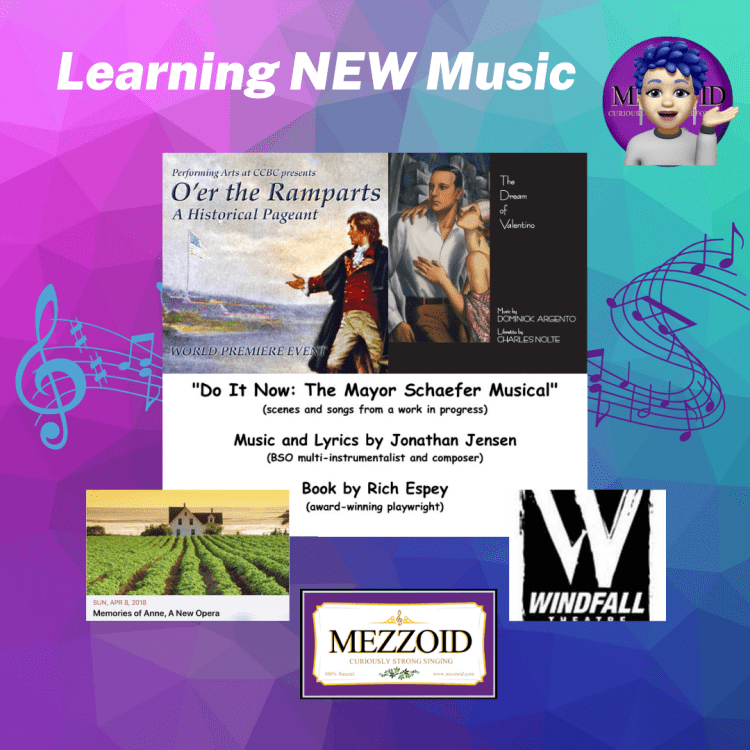I subscribe to a blog called The Bulletproof Musician, which deals with the psychological aspects of music making, including, but not limited to, performance anxiety and practicing. The author of the blog, Dr. Noa Kageyama, cites scientific studies in his posts as evidence of the efficacy of different methods of conquering a particular musical chore (which reminds me, I have a blogpost in mind about the difference between efficacy, efficiency, and effectiveness, but that will come another time).
One of the recent topics was learning new music by listening to recordings. The study cited showed that doing so was effective in learning music faster.
To which many of you might say, “DUH.” But should you really depend on recordings to learn your music?
For me, listening to a recording is valuable so that I can hear the piece as intended, along with the accompaniment, piano or orchestral, so that I know how it’s supposed to sound as a whole. Sometimes I’ll listen to multiple pieces to hear different interpretations. But then I put it aside and don’t listen again until I’ve learned it – maybe after I’ve performed it, maybe just before – and often, I find that I like my interpretation better!
But what do you do when you’re learning something for which there is NO recording??
I have been fortunate enough to have been given the opportunity to create roles in FIVE staged world premieres:
- The Woman in Red, Dream of Valentino (Washington Opera)
- Mary Pickersgill, O’er the Ramparts (Community College of Baltimore County)
- Beatrice, Inferno, (Windfall Theatre, Milwaukee, WI)
- Rachel Lynde, Memoirs of Anne (Harford Community College, Bel Air, MD)
- Bertha/Jean, Do It Now! (Stevenson University, Baltimore)

Inferno! (2004??)
And when I did Pilar in Rosina (Skylight Opera Theatre, Milwaukee), there was no recording available.
In the cases of O’er the Ramparts, Inferno, Memoirs, and Do It Now, the composer was on hand and willing to work with the singers to help us bring their score to the stage. Paula Foley Tillen actually wrote Beatrice specifically for me, so it suited my voice. With Washington Opera (now Washington National Opera) and Skylight, I was fortunate enough to have wonderful music directors (the late Alan Nathan and Richard Carsey) who worked with us as if the music had been their own. (I can’t believe I haven’t written about the death of Alan yet… that’s also coming.) But despite their assistance, there was still a lot of work to be done on my own so that I could live up to the task at hand.
What personal factors do you need to have in order to create a role when you don’t have a recording available to play incessantly in the background?
- Self-confidence
This is a big responsibility – the fact that you were given it is enough to boost your self-confidence! - A good ear and a sense of relative pitch
Especially if it’s something that is particularly atonal or weird - A good relationship with your colleagues
Particularly your conductor and, if available, the composer. Don’t be afraid to explore different ideas with them! - A recording device to use in rehearsals so that you have something to work with on your own
We all carry these around now – they’re called phones – but who actually talks on one anymore? - A teacher or vocal coach who can work with you before rehearsals start
Assuming you aren’t given the music at the first rehearsal and are learning on the job, that way you can come in prepared! - Openness to trying something new
It’s very likely, especially if the composer is on-site, that they might decide to change things (maybe they have a better idea, maybe something is just not working once they see it on stage, maybe it’s a timing thing, or maybe they want to make it better for the singers), and you have to be able to roll with it! - Curiosity
Ah, a term near and dear to my heart! What better way can you answer the question, “I wonder what would happen if” than by doing something no one has done before?
Listen to Barbara Cook talk about her process in learning “Glitter and be Gay” from Candide – she didn’t read music and had never sung anything like that before (which boggles the mind). She even asked Bernstein to change something that she thought would make it better, and he did it.
Embrace new works and you will be in demand as a singer/actor, especially if you can learn music quickly and make it your own! Think of all the roles created by Sutton Foster: Millie, Violet, Jo, Inga.. and who knows what else is to come?
**************
If you are curious about learning new repertoire and breathing new life into older songs as well, why not check out Mezzoid Voice Studio’s approach to Curiously Strong Singing & Performing? And if that appeals to you, try a Vocal Discovery Session and see if it’s a good fit!
